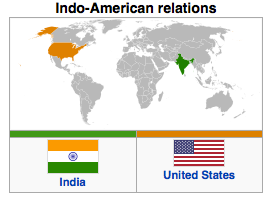Obama And The Indo-US Relationship: Old Issues, New Opportunities – Analysis
By IPCS
By PR Chari
Informed opinion ascribes President Obama’s victory to his dedicated supporters among women, Hispanics, African Americans, young persons and working class Whites revealing the changed demographics in the most powerful country in the world. These constituencies will now seek their rewards, while the administration will wish to continue its on-going policies. Obama will also have to reach a modus vivendi with the Republicans to pursue his future initiatives on the domestic and foreign policy fronts with their cooperation.

India must evaluate Obama’s victory against this backdrop, which has palpable consequences for Indo-US relations. The UPA government’s indecision and rollback of decisions on issues of bilateral interest, is obviously an irritant. The excuse that the UPA’s policy paralysis arises from the ‘compulsions of coalition government’ carries little conviction. In this milieu, New Delhi’s galvanization of its economic and trade policies by allowing the entry of FDI in retail, permitting greater foreign participation in the banking and insurance sectors and so on has been welcomed in the US. Apart from revealing that the UPA government has finally resolved to arrest the drift and govern the country, these decisions provide opportunities for US firms to enter the Indian market and create jobs. New Delhi should now formulate a comprehensive FDI policy in the interests of clarity and pursuing its stated policy of globalizing its economy.
India’s Nuclear Civil Liability Act is of special interest to Washington, which is inhibiting American and other foreign operators from entering India’s atomic energy sector. It might be recollected that the Bush administration had forced the Indo-US nuclear deal through the US Congress, the IAEA and the Nuclear Suppliers Group in 2008. Condoleezza Rice had made clear that she expected India to provide in return, a fair share of its new reactor business, which has not happened to date. India should level with the new Obama administration, and explain its problems with establishing new atomic reactors in the teeth of domestic opposition, as evident in Jaitapur and Kudankulam. Instead, India could seek US cooperation in other areas of energy security like technologies to optimize the use of coal, extract shale oil, develop solar power and improve energy efficiencies in manufacturing industries.
But, it is in the sphere of foreign policy that Indo-US relations need careful tending in the Obama-II era. Two aspects need special attention.
- First, it can be reasonably expected that the American ‘pivot’ or ‘re-balancing’ towards Asia will be invigorated. Shorn of its rhetoric, the US wishes to grow its relations with the countries of East and Southeast Asia to contain the newly assertive China. The cooption of India into this strategy is of signal importance for Washington, to bracket China between the mature economy of Japan and the rising emergence of India. New Delhi must think through where its best interests lie; by remaining neutral or by adopting a pro-active, issue-based policy towards China. Beijing has not shown much concern for India’s sensitivities by establishing a quasi-military presence in Pakistan’s Gilgit-Baltistan region or pursuing its ‘string of pearls’ strategy to establish its maritime presence in the Indian Ocean. Why, then, should India be ultra-sensitive about China’s concerns regarding India’s strategic linkages, alongside the US, in East and Southeast Asia?
- Second, the withdrawal of the US and NATO forces from Afghanistan is most likely to proceed on schedule. What will happen thereafter is of vital interest to the US and India. Could they view with equanimity, a takeover of Afghanistan by the Taliban and the revival of the al Qaeda? Parenthetically, Obama had repeatedly referred to the SEAL’s raid that eliminated Osama bin Laden in Abbottabad last May. A serious dialogue between Washington and New Delhi is urgently required to make certain that a Taliban/al Qaeda takeover of Kabul does not occur again. Very likely, this is the endgame that the Pakistan Army is hoping will unfold so that Rawalpindi achieves its goal of gaining ‘strategic depth’ in Afghanistan. How this nightmare scenario could be averted, perhaps by the US continuing a vestigial presence in airbases like Bagram, and India continuing its efforts to train Afghan civil, police and military forces and continue providing developmental assistance might be the answer. But there are several other issues, like the role of other regional powers, which require serious reflection and appropriate action.
How the US and India could enlarge their understanding of other regional problems like the unfolding but problematical democratization of the Gulf and Middle Eastern region, the arrest of Iran’s determined quest for nuclear weapons, the slow return of Myanmar to the comity of nations and the eradication of maritime piracy are further issues that require consideration within the ambit of Indo-US relations. Continuing these discussions with the Obama-II government will be easier than with a new Republican set up.
PR Chari
Research Professor, IPCS
